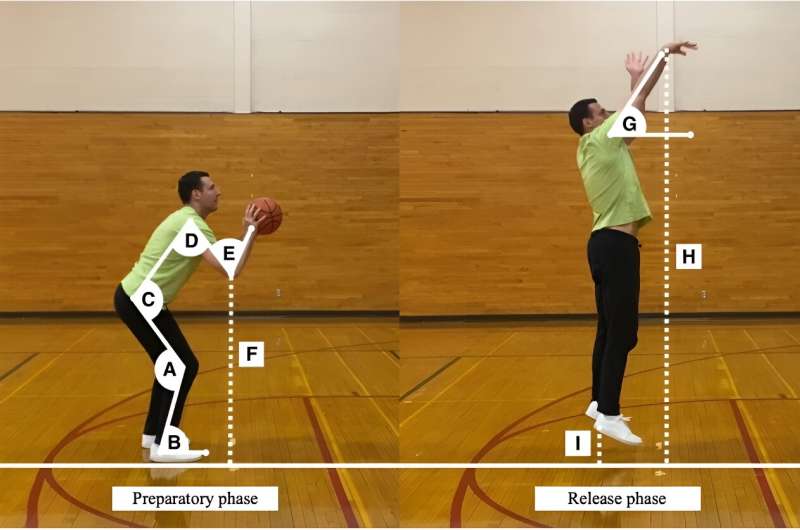This article has been reviewed according to Science X's editorial process and policies. Editors have highlighted the following attributes while ensuring the content's credibility:
fact-checked
trusted source
proofread
Study shows weightlifting before basketball practice does not affect shooting accuracy

Research from the University of Kansas could help settle a question among basketball coaches and athletes on when to incorporate weightlifting during practice.
In a study published in the journal Frontiers in Sports and Active Living, researchers found that resistance training before basketball practice has minimal to no effect on shooting performance in most cases.
"That was the main question that initiated this study: Should basketball players lift weights before or after practice, and does it affect their shooting mechanics and accuracy?" said Dimitrije Cabarkapa, associate director of the Jayhawk Athletic Performance Laboratory at KU and lead author of the study.
Strength is one of the key physical performance characteristics that basketball players need to possess at all levels of play. To maintain an adequate level of strength gained during the offseason, continuous participation in resistance training regimens is imperative, the authors said. Yet, the concern that often emerges is that lifting weights could negatively affect players' performance in practice and that poor practices could be reflected in lower-quality gameplay.
For the study, researchers recruited ten basketball players with more than four years of playing experience and more than two years of resistance training experience. They also had to be capable of making more than 50% of free-throw and 2-point shooting attempts and more than 30% of 3-point shooting attempts.
Participants performed a series of basketball shooting drills comprising 15 free-throw, 2-point, and 3-point shots. Each participant visited the lab four times, assigned in randomized order—familiarization session, control condition and lower- and upper-body training sessions. For a control condition, participants performed a standardized warm-up routine, then completed five sets of shooting drills. Each session was completed in 30-minute increments.
Shooting accuracy was recorded in terms of the number of shots made, while a high-speed camera was used to analyze kinematic variables during the preparatory and release phases of the shooting motion, such as knee angle, elbow flexion, and release height. The total number of shots analyzed in this study across all participants was 6,750.
Results showed that performing resistance training had minimal impact on shooting accuracy. The only scenario in which shooting accuracy decreased was after performing the upper-body resistance training protocol, where 2- and 3-point shooting accuracy decreased by 11.8% and 9.9% when compared to the control condition, respectively.
However, the observed decrease in shooting accuracy disappeared 30 minutes post-exercise completion. In addition, the changes in shooting mechanics were negligible, with less than 1% of the total variance in each kinematic variable.
"One of the key findings is that some of the commonly implemented basketball-specific lower- and upper-body resistance training regimens during the in-season competitive period have minimal to no impact on the biomechanical parameters examined in this study during both preparatory and release phases of the shooting motion," Dimitrije Cabarkapa said.
"However, what did change is shooting accuracy immediately following the upper-body training session, but this decrement in performance disappeared after the second set of shooting drills at the 30-minute time mark, and it remained absent through the rest of the testing period."
The study was co-written with Damjana Cabarkapa, Shay Whiting, Nicolas Philipp, Drake Eserhaut, and Andrew Fry, all of KU, and Anthony Ciccone of Utah Valley University.
The findings could help coaches and strength and conditioning trainers when developing training plans, especially considering the time constraints on the collegiate level of competition.
As a former NCAA Division I basketball player at James Madison University, Dimitrije Cabarkapa said that in his experience, players often did not like to lift weights before practice. The common theory was that such exercises would impair shooting efficiency, which could negatively affect their standing with coaches or potentially carry over to poor play during games.
"Based on our findings, performing resistance exercises before basketball practice has minimal effect on shooting accuracy. The myth of "I can't lift weights before practice because it will hurt my game' appears to not be true," Cabarkapa said. "Players may be upset to hear that, but a lot of coaches will be happy as they can use these data to say, "Yes, you can lift before practice.'"
If necessary, upper-body training protocols may be performed post-training sessions to minimize the possible effect—however slight—on shooting accuracy, the authors said.
The results add to the growing body of literature published by the Jayhawk Athletic Performance Laboratory, part of the Wu Tsai Human Performance Alliance, focused on examining factors that contribute to optimal basketball performance, including whether breakfast influences shooting performance and the biomechanical characteristics of proficient free-throw, 2-point and 3-point shooters.
More information: Dimitrije Cabarkapa et al, Acute influence of resistance exercise on basketball shooting mechanics and accuracy, Frontiers in Sports and Active Living (2023). DOI: 10.3389/fspor.2023.1272478





















